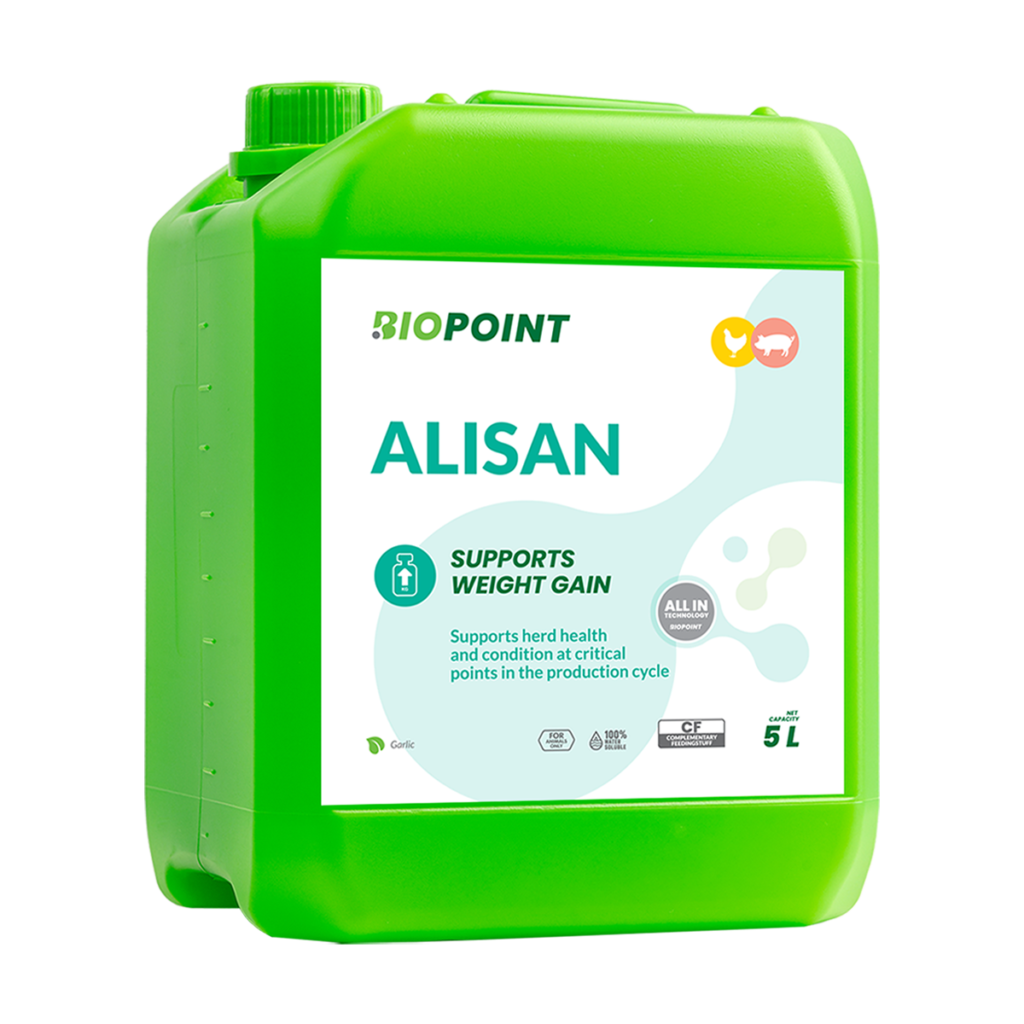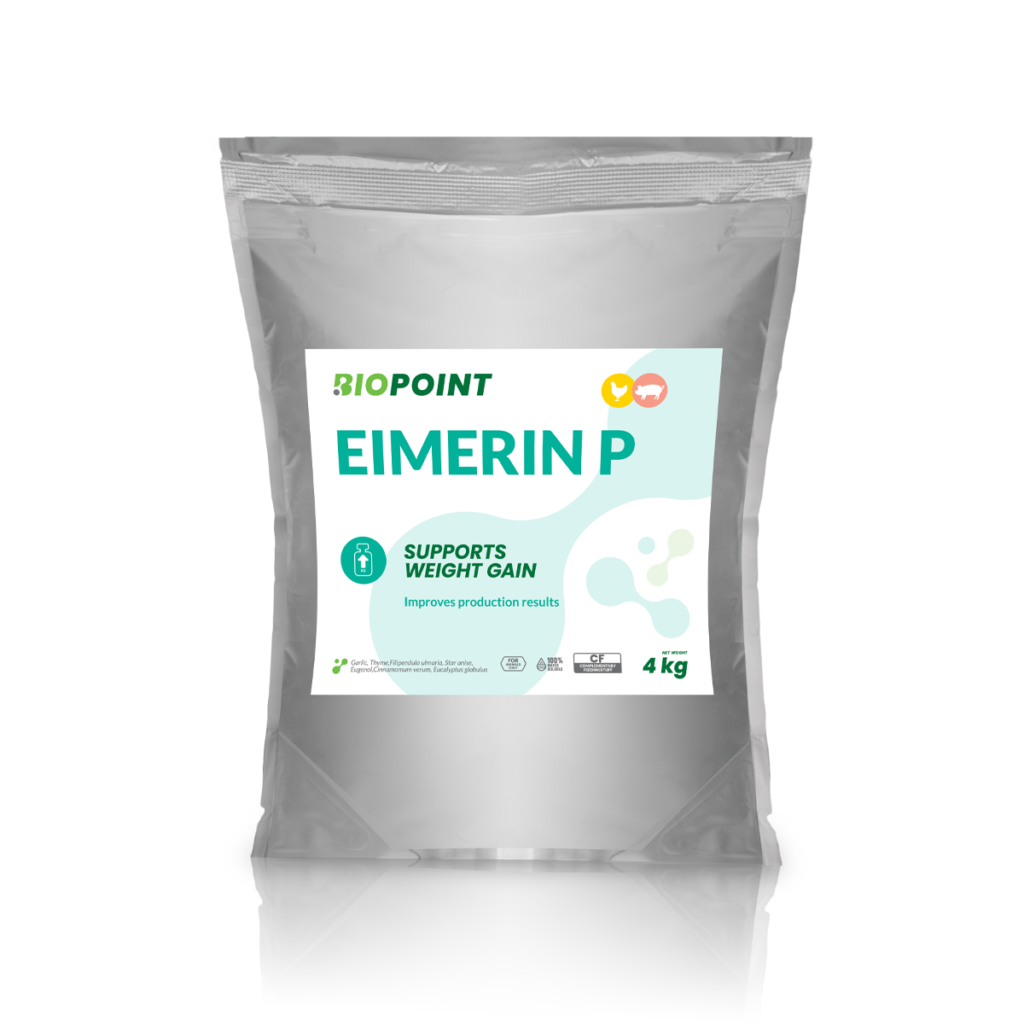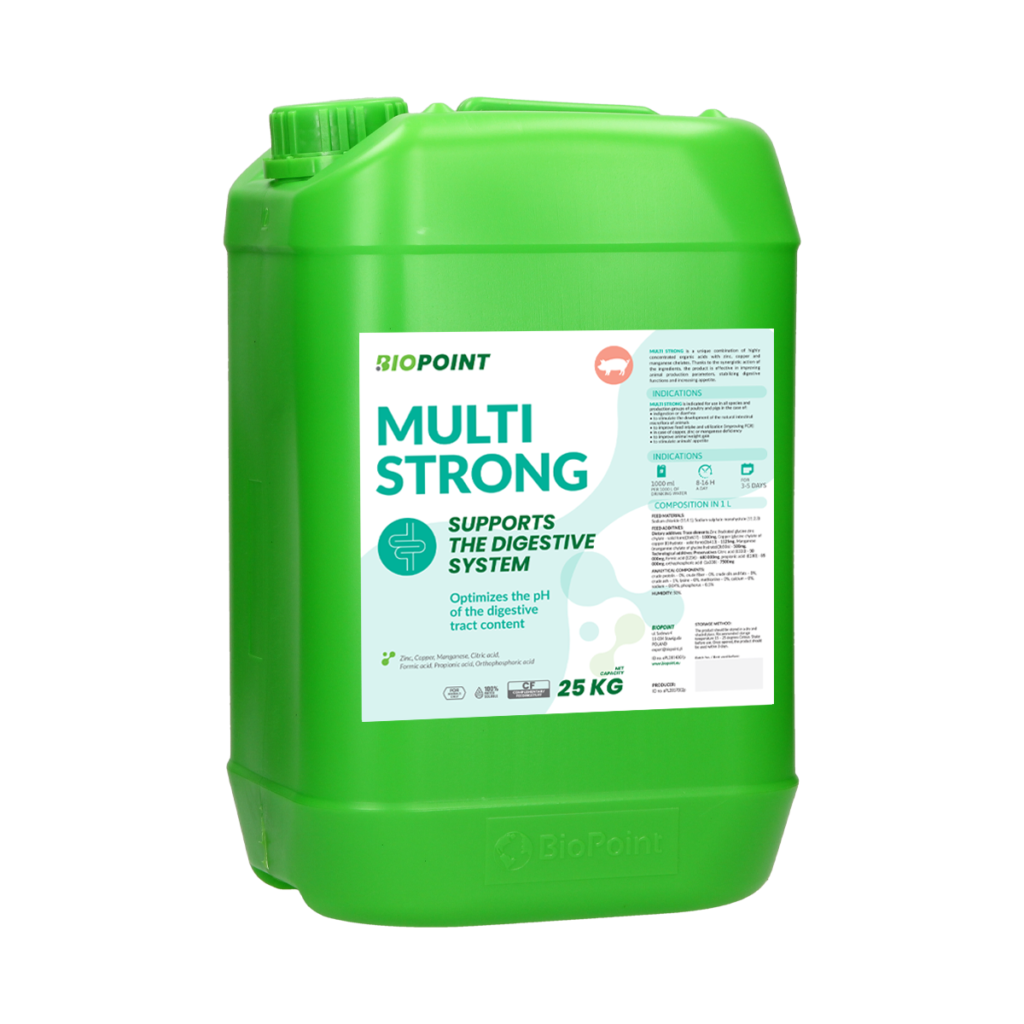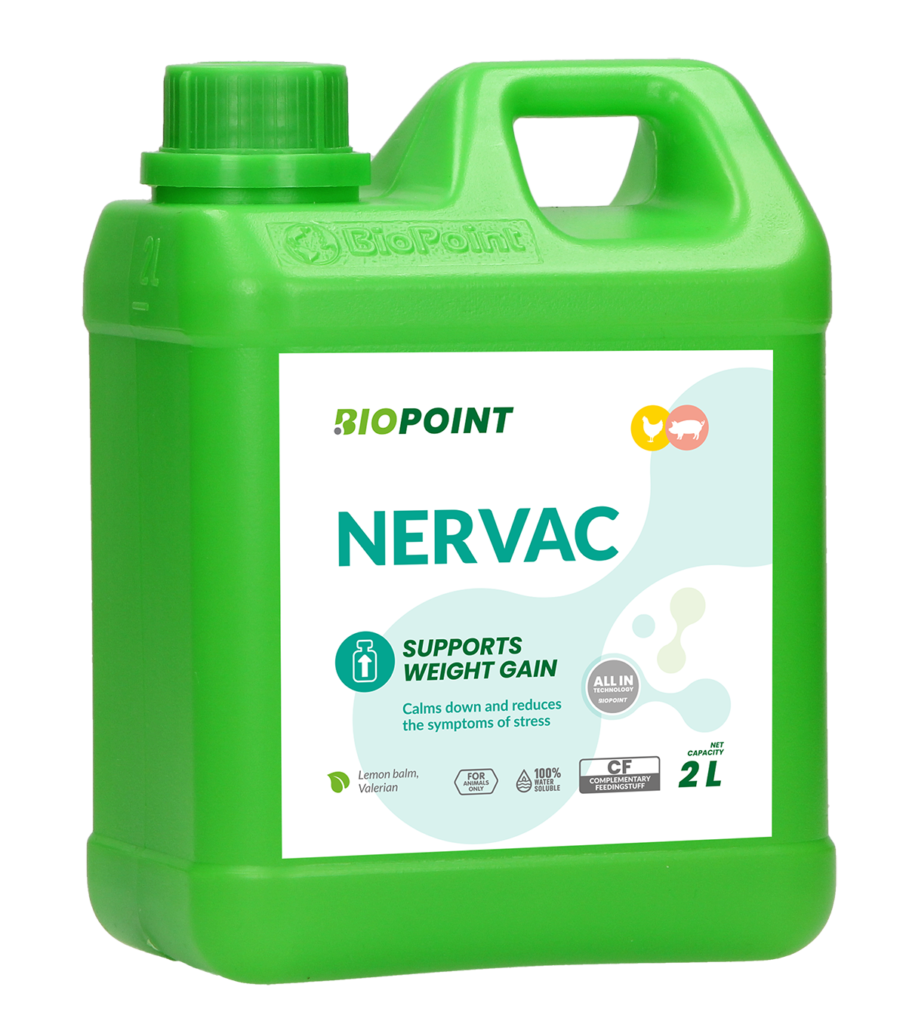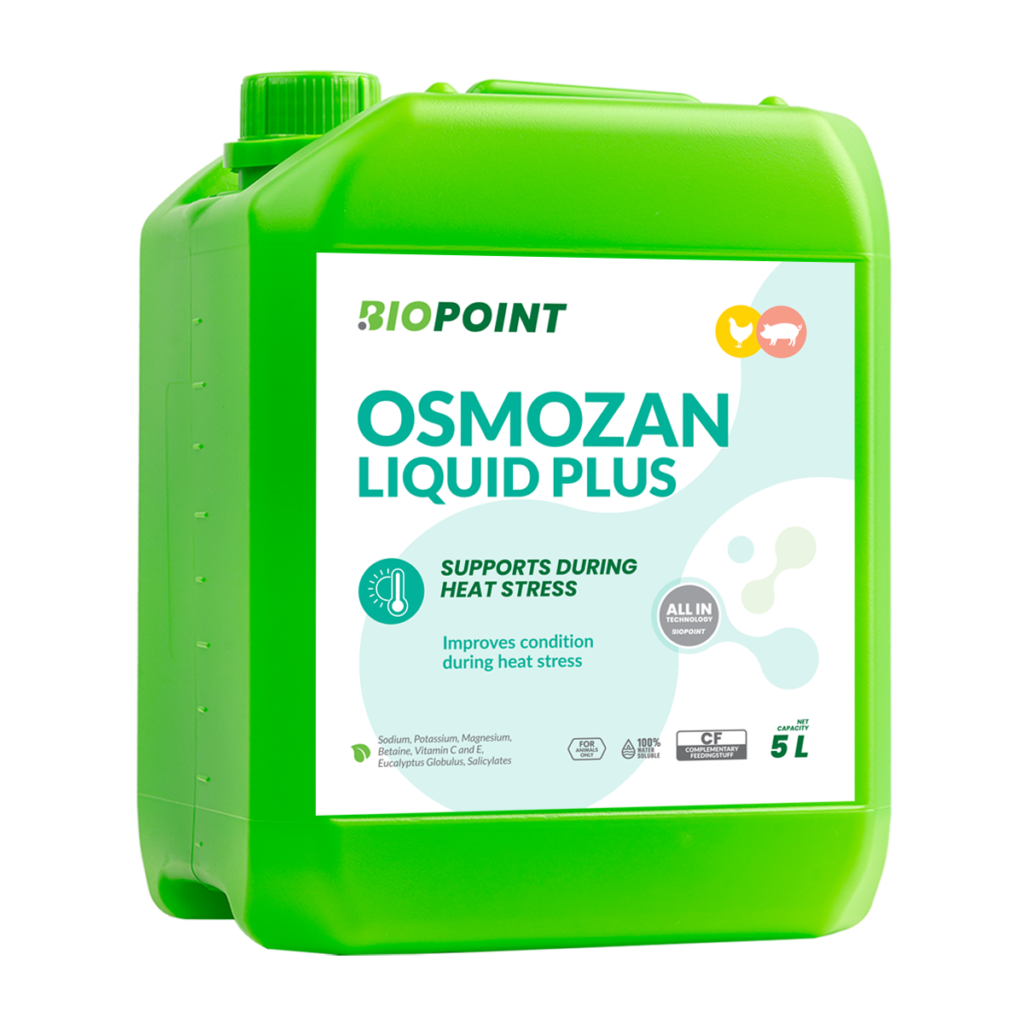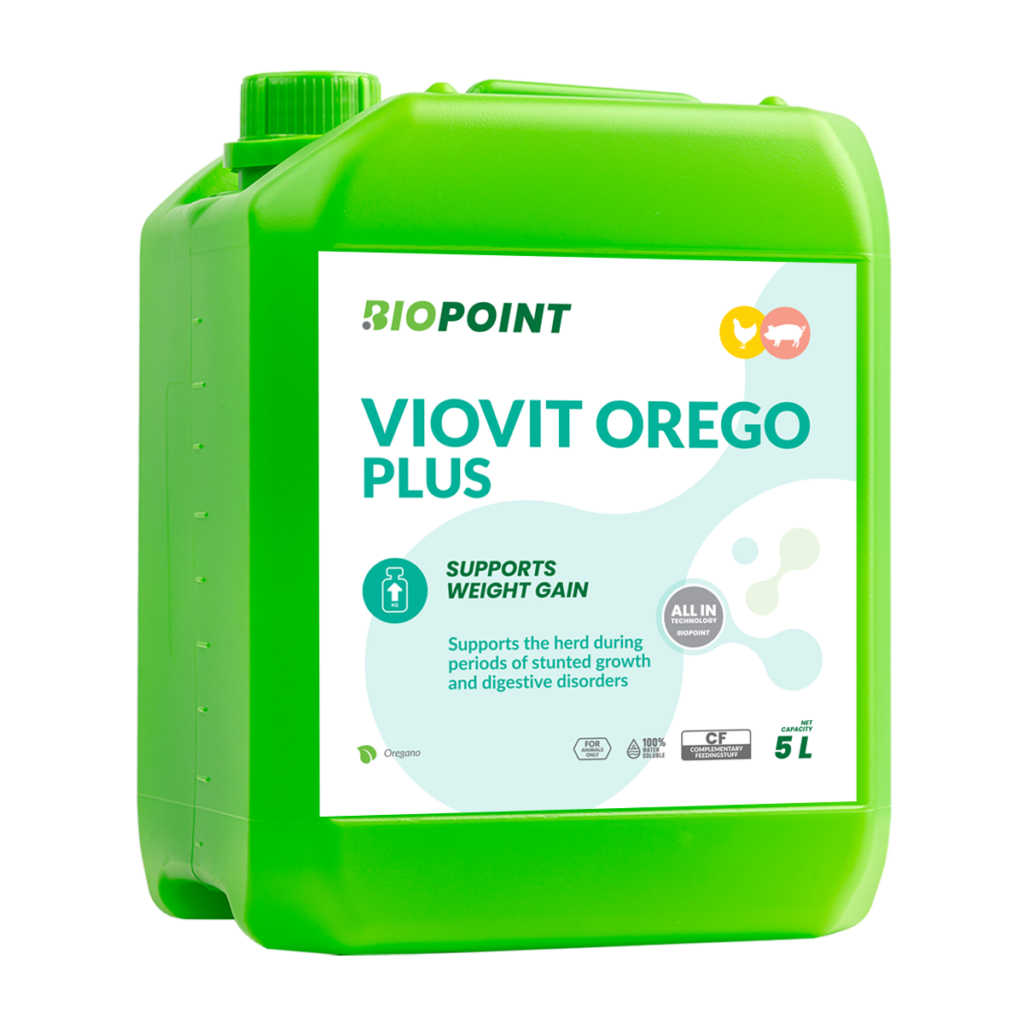
Weight gain – Pigs
ALISAN
MULTI STRONG
OSMOZAN LIQUID PLUS
STIMSEPT
VIOVIT OREGO PLUS
Ask about the product
BioPoint - support for pigs in weight gain
Achieving optimal weight gain in swine is a critical objective for pig farmers, impacting both the profitability and sustainability of their operations. The process of increasing swine mass involves a multifaceted approach, integrating nutrition, health management, and environmental considerations. Effective strategies for weight gain not only improve overall production efficiency but also enhance the well-being of the animals. In this comprehensive guide, we will explore various factors influencing swine weight gain, focusing on the role of balanced diets, feed supplements, and health management practices. By understanding these elements, farmers can implement more effective methods to achieve their weight gain goals.
Understanding the Fundamentals of Weight Gain in Swine
Weight gain in swine is influenced by numerous factors, all of which must be carefully managed to ensure optimal growth. The fundamentals include providing a balanced diet, maintaining a healthy herd, and creating a conducive environment for growth. Nutrition plays a crucial role, as pigs require a precise balance of proteins, carbohydrates, fats, vitamins, and minerals to grow efficiently. Health management is equally important; preventing and controlling diseases can significantly impact growth rates. Environmental factors such as housing, temperature, and space also affect how well pigs convert feed into body mass. Understanding and integrating these fundamentals are essential for achieving consistent and healthy weight gain in swine.
The Role of Balanced Nutrition in Swine Growth
Balanced nutrition is the cornerstone of successful weight gain in swine. Pigs need a well-rounded diet that provides all the necessary nutrients in the correct proportions to support their rapid growth and development. Proteins are vital for muscle growth, while carbohydrates and fats provide the energy required for daily activities and metabolic processes. Vitamins and minerals are essential for various bodily functions, including immune response and bone development. A diet lacking in any of these components can lead to suboptimal growth, health issues, and poor feed conversion ratios. Therefore, formulating a diet that meets the specific needs of pigs at different growth stages is fundamental for achieving optimal weight gain.
Environmental Factors Affecting Swine Growth Efficiency
The environment in which pigs are raised has a profound impact on their growth efficiency. Key environmental factors include housing conditions, temperature control, ventilation, and space allowance. Pigs thrive in environments that are clean, well-ventilated, and have a stable temperature. Overcrowding can lead to stress, aggression, and a higher incidence of disease, all of which negatively affect growth rates. Proper ventilation helps in maintaining air quality, reducing the risk of respiratory problems. Temperature control is crucial as pigs are sensitive to extreme temperatures, which can lead to heat stress or hypothermia. Providing an optimal environment is essential to support efficient growth and weight gain in swine.
Importance of a Balanced Diet for Weight Gain
A balanced diet is critical for ensuring consistent weight gain in swine. The diet must be carefully formulated to include the right proportions of macronutrients and micronutrients. Carbohydrates and fats provide the energy needed for growth and daily activities, while proteins supply the amino acids necessary for muscle development. Vitamins and minerals are required for metabolic functions and maintaining overall health. Additionally, the diet should be adjusted to meet the changing needs of pigs as they grow and develop. This includes varying the protein and energy levels to match the different growth stages, ensuring that pigs receive the optimal nutrition needed for healthy weight gain.
Essential Nutrients for Optimal Swine Growth
To achieve optimal growth, swine diets must include essential nutrients in the right amounts. Proteins, composed of amino acids, are crucial for muscle growth and repair. Carbohydrates are the primary source of energy, while fats provide a concentrated energy source and aid in the absorption of fat-soluble vitamins. Vitamins, such as A, D, E, and K, play various roles in maintaining health and supporting growth. Minerals, including calcium, phosphorus, and zinc, are important for bone development and metabolic processes. Each of these nutrients must be provided in the correct balance to ensure that pigs grow efficiently and remain healthy throughout their development.
Tailoring Diets for Different Growth Stages
Swine have different nutritional needs at various stages of their growth, and their diets should be tailored accordingly. During the early stages of life, piglets require high-protein diets to support rapid growth and development. As they transition to the grower phase, their energy needs increase, and their diet should reflect this by incorporating more carbohydrates and fats. In the finisher stage, the focus shifts to maximizing weight gain and preparing pigs for market, requiring a diet that promotes efficient feed conversion and optimal fat deposition. Tailoring diets to these specific growth stages ensures that pigs receive the appropriate nutrition at each phase, supporting healthy and efficient growth.
Enhancing Growth with Feed Supplements
Feed supplements play a crucial role in enhancing growth rates and overall health in swine. These supplements can include a variety of additives such as vitamins, minerals, amino acids, and probiotics. Chelated minerals and organic acids, for example, improve the bioavailability of nutrients, ensuring that pigs can absorb and utilize them more efficiently. Probiotics and prebiotics support gut health by promoting beneficial bacteria, which can enhance digestion and nutrient absorption. These supplements can also help in mitigating the negative effects of stress, disease, and suboptimal environmental conditions, thereby supporting more consistent and robust weight gain in swine.
Benefits of Chelated Minerals and Organic Acids
Chelated minerals and organic acids offer significant benefits for swine growth and health. Chelated minerals are minerals bound to organic molecules, which enhances their absorption in the digestive tract. This improved bioavailability means that pigs can utilize these minerals more effectively, supporting better bone development, enzyme function, and overall growth. Organic acids, on the other hand, help to lower the pH of the gastrointestinal tract, creating an unfavorable environment for harmful bacteria and improving nutrient digestibility. The use of these additives can lead to more efficient feed conversion, healthier pigs, and ultimately, better weight gain outcomes.
Improving Nutrient Absorption and Gut Health
Improving nutrient absorption and gut health is essential for maximizing swine growth and weight gain. The gastrointestinal tract plays a vital role in breaking down feed and absorbing nutrients, so maintaining a healthy gut environment is crucial. Probiotics and prebiotics can enhance gut health by fostering a balanced microbiota, which aids in digestion and nutrient absorption. Enzymes added to feed can break down complex carbohydrates and proteins, making nutrients more accessible to the pigs. Ensuring optimal gut health not only improves feed efficiency but also strengthens the immune system, reducing the incidence of disease and supporting overall growth.
Health Management for Maximizing Weight Gain
Effective health management is critical for maximizing weight gain in swine. Healthy pigs grow faster and more efficiently, so preventing and controlling diseases is a top priority. This includes implementing comprehensive vaccination programs to protect against common swine diseases and maintaining strict biosecurity measures to prevent the introduction and spread of pathogens. Regular health monitoring allows for early detection and treatment of health issues, minimizing their impact on growth. Additionally, providing a stress-free environment and addressing any health concerns promptly can help ensure that pigs remain healthy and continue to gain weight efficiently.
Preventive Measures and Vaccination Programs
Preventive measures and vaccination programs are essential components of a successful swine health management strategy. Vaccinations protect pigs from a range of infectious diseases that can hinder growth and productivity. A well-planned vaccination schedule tailored to the specific health challenges of the herd ensures that pigs develop immunity against these diseases at the right time. Preventive measures also include maintaining high standards of hygiene in housing facilities, providing clean water, and ensuring that feed is free from contaminants. Implementing these practices helps to create a healthy environment where pigs can thrive and grow to their full potential.
Monitoring and Responding to Health Issues
Regular monitoring and prompt response to health issues are vital for maintaining a healthy herd and supporting weight gain. This involves routine health checks and the use of diagnostic tools to identify potential problems early. Farmers should be trained to recognize the signs of common health issues, such as respiratory infections, digestive problems, and nutritional deficiencies. When health problems are detected, swift action is necessary to treat affected animals and prevent the spread of disease. Working closely with veterinarians to develop and implement effective treatment protocols ensures that pigs remain healthy and can continue to grow efficiently.
Innovative Approaches in Feed Supplementation
Innovative approaches in feed supplementation are revolutionizing the way swine farmers achieve weight gain and overall herd health. Advances in nutritional science and technology have introduced new types of supplements that enhance growth performance more effectively than traditional methods. These innovations include the use of plant extracts, enzymes, and precision-formulated nutrient blends. Plant extracts, such as those from oregano or garlic, have natural antimicrobial properties and can support gut health. Enzymes help break down feed components that pigs might otherwise find indigestible, improving nutrient availability. Precision nutrition, where feed is tailored to the exact needs of the pigs, ensures that they receive optimal levels of all necessary nutrients at different growth stages.
Utilizing Natural Extracts for Digestive Support
Natural extracts, such as those derived from oregano, garlic, and thyme, are increasingly used in swine diets to support digestive health and improve growth performance. These extracts possess antimicrobial properties that help maintain a healthy balance of gut microbiota, reducing the prevalence of harmful bacteria. This promotes better digestion and nutrient absorption, leading to more efficient feed conversion and weight gain. Additionally, natural extracts can enhance the immune system, making pigs more resilient to infections and stress. Incorporating these natural substances into feed not only supports the digestive system but also aligns with consumer preferences for more natural and sustainable farming practices.
Advanced Microelement Supplementation Strategies
Advanced microelement supplementation strategies involve the use of highly bioavailable forms of essential minerals, such as chelated zinc, copper, and manganese. These chelated minerals are bound to organic molecules, which improves their absorption and utilization by the pigs. This results in better bone development, enzyme function, and overall health. Enhanced bioavailability of these minerals means that lower quantities are needed to achieve the desired effects, reducing the risk of toxicity and environmental contamination. By employing these advanced strategies, farmers can ensure that their pigs receive the necessary nutrients for optimal growth, leading to improved weight gain and overall productivity.
Practical Applications and Case Studies
Practical applications and case studies provide valuable insights into the effectiveness of various weight gain strategies in real-world farming scenarios. Farmers who have implemented advanced feed supplements and optimized their management practices often report significant improvements in growth rates and overall herd health. Case studies highlight specific instances where targeted interventions, such as the use of chelated minerals or natural extracts, have resulted in measurable benefits. These examples demonstrate how theoretical knowledge can be applied practically to enhance productivity. By studying these success stories, other farmers can gain inspiration and practical tips to implement similar strategies in their operations.
Success Stories Using Biopoint Feed Additives
Several success stories illustrate the positive impact of Biopoint feed additives on swine weight gain and overall farm profitability. For instance, farmers who have integrated Biopoint's chelated mineral supplements into their feeding regimes have observed notable improvements in growth rates, feed conversion ratios, and animal health. One case study involved a farm that experienced a 15% increase in average daily weight gain after adopting Biopoint's products. Another farm reported a significant reduction in disease incidence and improved herd resilience. These success stories underscore the effectiveness of Biopoint's innovative feed solutions in promoting healthier, faster-growing pigs and enhancing the economic viability of swine farming operations.
Evaluating the Economic Impact of Improved Weight Gain
Evaluating the economic impact of improved weight gain in swine is essential for understanding the return on investment for various feeding and management strategies. Increased weight gain translates directly to higher market weights and better prices for pigs at sale. Additionally, improved feed conversion ratios mean that less feed is required to achieve these weight gains, reducing overall feed costs. Healthier pigs also incur lower veterinary and medication expenses. By analyzing these economic factors, farmers can assess the financial benefits of implementing advanced nutritional and management practices. This evaluation helps in making informed decisions that optimize both productivity and profitability in swine farming.
Summary
Achieving optimal weight gain in swine requires a comprehensive approach that integrates balanced nutrition, advanced feed supplementation, effective health management, and a conducive environment. By understanding the fundamentals of swine growth and employing innovative strategies, farmers can significantly enhance their productivity and profitability. Biopoint's feed additives, including chelated minerals and natural extracts, offer effective solutions that support better growth rates, improved health, and efficient feed conversion. The success stories and economic evaluations presented highlight the tangible benefits of these approaches. Implementing these strategies can lead to healthier, faster-growing pigs and a more sustainable and profitable swine farming operation.
